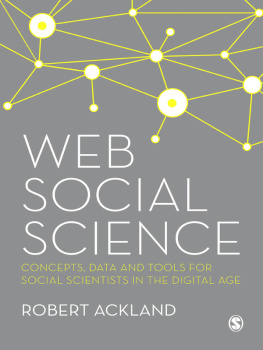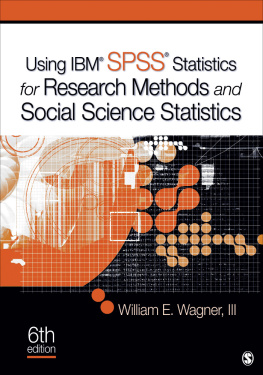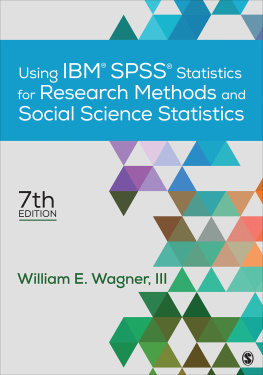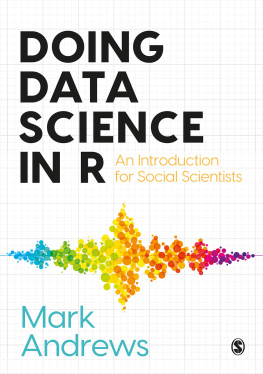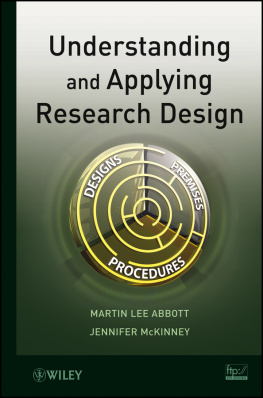Understanding and Doing Successful Research
Understanding and Doing Successful Research
Data Collection and Analysis for the Social Sciences
Shaun Best
First published 2012 by Pearson Education Limited
Published 2013 by Routledge
2 Park Square, Milton Park, Abingdon, Oxon OX14 4RN
711 Third Avenue, New York, NY 10017, USA
Routledge is an imprint of the Taylor & Francis Group, an informa business
Copyright 2012, Taylor & Francis.
The right of Shaun Best to be identified as author of this Work has been asserted by him in accordance with the Copyright, Designs and Patents Act 1988.
All rights reserved. No part of this book may be reprinted or reproduced or utilised in any form or by any electronic, mechanical, or other means, now known or hereafter invented, including photocopying and recording, or in any information storage or retrieval system, without permission in writing from the publishers.
Notices
Knowledge and best practice in this field are constantly changing. As new research and experience broaden our understanding, changes in research methods, professional practices, or medical treatment may become necessary.
Practitioners and researchers must always rely on their own experience and knowledge in evaluating and using any information, methods, compounds, or experiments described herein. In using such information or methods they should be mindful of their own safety and the safety of others, including parties for whom they have a professional responsibility.
To the fullest extent of the law, neither the Publisher nor the authors, contributors, or editors, assume any liability for any injury and/or damage to persons or property as a matter of products liability, negligence or otherwise, or from any use or operation of any methods, products, instructions, or ideas contained in the material herein.
ISBN 978-1-4082-2922-4 (pbk)
British Library Cataloguing-in-Publication Data
A catalogue record for this book is available from the British Library
Library of Congress Cataloging-in-Publication Data
A catalog record for this book is available from the Library of Congress
Brief contents
The publishers would like to thank the anonymous panel of reviewers for their support with the development of the manuscript. The publishers would further like to thank the author for the dedication and skill he demonstrated in producing this book.
We are also grateful to the following for permission to reproduce copyright material:
Extracts on pages 845 from Looking at People and Asking Why?: An ethnographic approach to religious education, Religious Education, 96(3), 38694 (Crain, MA 2001), reprinted by permission of the publisher (Taylor & Francis Ltd, http://www.tandf.co.uk/journals). Extracts on pages 2258 from Ethical Coherence, Philosophical Psychology 11(4), 40522 (Thagard, P 1998), reprinted by permission of the publisher (Taylor & Francis Ltd, http://www.tandf.co.uk/journals).
In some instances we have been unable to trace the owners of copyright material, and we would appreciate any information that would enable us to do so.
By the end of this chapter you should have an understanding of:
what researchers understand by data collection and data analysis
three different styles of research: policy-oriented research, action research and theoretically-oriented research
the difference between conducting research deductively and conducting research inductively
where research questions come from
the role of values and beliefs in the formation of research questions and in the conduct of the research process
why it is important to have a clear rationale for your research project
what the conventional stages in the design and execution of a research project are.
What can this book offer you? It takes it for granted that you are new to research and that you have no previous knowledge of data collection or data analysis. This book also imagines that you have been asked to complete a research project and that you do not know what to do. In addition, it guesses that some of you are starting to panic because you do not really know what you are doing! Many social science textbooks, especially those written for 1619-year-old students contain a chapter on research methods, but usually this is little more than lists of the advantages and disadvantages of different methods of data collection and nothing about data analysis. In addition, because those who write textbooks for 1619-year-olds are probably not active researchers themselves, these books tend not to give practical advice on how do a research project.
This book will help you to think about doing research projects of your own but perhaps, more importantly, it will help you to develop a range of skills and abilities that will allow you to evaluate more fully other peoples research projects in relation to data collection, data analysis and inference (i.e. what you can deduce or conclude from their results).
Thinkpiece
You might want to ask yourself these questions before you read on: whose research do you admire? And why do you admire it?
If you cannot answer these questions because you have only read summaries of research findings in textbooks then you need to change your reading habits. The following chapter on how to conduct a literature review will explain how to search for relevant research in academic journals and other relevant sources and why you need to do so.
Note on assessment
The chapters in this book will outline the central concepts, techniques and perspectives that underpin the process of doing research. However, if you are a student doing a research project there will be a set of assignment criteria that should clearly explain what you have to do in order to complete the assignment successfully. Always read the assessment criteria! You need to understand fully these criteria and ask the member of staff responsible for setting the assessment if you are unsure of any aspect. What type of data is the assignment looking for: statistical data, an understanding of the respondents motives and intentions, is a large sample of people to be surveyed or is a case study all that is required?
This book will provide you with an evaluation of the most popular methods of data collection and data analysis that are used within the social sciences. It will help you to write a justification for your choice of data collection methods and your choice of data analysis techniques. The book will also give you practical advice on each step of the research process from having your initial idea for a question to investigate to writing the concluding paragraph of your research report.
In addition, most research methods textbooks do not explain to their readers how much fun you can have doing a research project, how imaginative you can be in choosing your methods of data collection and in explaining to your reader how you made sense of the data you have collected, and how innovative you can be in the way in which you build your explanations about how and why people behave in the way that they do.
Research allows us to answer questions about the world, about things we do not understand or that we find interesting or disturbing. We conduct our research in a systematic manner that allows us to make a connection between the observations we make or the data we collect and theories about the world. Broadly speaking, within the social sciences there are three forms of research:


